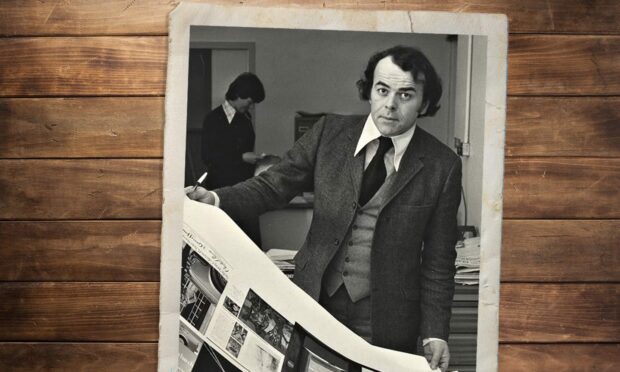Journalist Rick Wilson, who began his career on the long-gone Montrose Standard and went on the launch the Scotsman’s colour magazine in the 1980s, has died aged 78.
He also had a spell interviewing stars for one of DC Thomson’s girls’ magazines and worked at the Herald and Scottish Daily Express in Glasgow and then the Daily Express in London.
After a period working on magazine production in Amsterdam Rick was headhunted by then Scotsman editor Eric Mackay to launch the new magazine.
Bold
It was a bold move because only the Sunday Times in London produced a glossy weekend magazine in those days.
Rick was to remain at the helm of the magazine for a decade before returning to work on titles including the Daily Telegraph, the Herald and the Sunday Mirror.
He was born in Forfar in June 1943 and grew up in Montrose.
Budding talent
Rick showed a good deal of creative promise while at Montrose Academy and got his break in newspapers because of a chance meeting.
His father, a police sergeant was doing his torchlit rounds of the streets and closes of the town when he came across the blazing lights of the Montrose Standard office.
There, sitting at the linotype machine and typing his stories directly to hot metal was editor Duncan Fraser.
Newspaper break
The sergeant asked why he was working so late and the editor told him he was short staffed. Immediately, the officer volunteered his son and so began a long career in journalism.
One of his first assignments was to interview Wee Willie Harris, Britain’s answer to Little Richard when he performed in Montrose.
This gave Rick a taste for showbusiness and he joined DC Thomson in Dundee where he wrote a magazine column under the byline Paul Destiny.
Showbusiness
He went on to interview stars including Billy Fury, Adam Faith and Joe Brown and, later during a spell on a London magazine, Lulu and Jackie Stewart.
When he moved to the Netherlands, Rick counted Don McLean and John Lennon among his interviewees.
Scoop
Shortly after being offered the Scotsman magazine job and while still living in Amsterdam, Rick landed what he considered his greatest scoop.
He spotted actor Rod Steiger having a drink a few tables away from him in the Pulitzer Hotel bar.
Rick took a chance and explained he was about a launch a magazine in Scotland.
Rod Steiger agreed to an interview and told Rick about previously unrevealed trials and tribulations, which appeared with impact in the magazine’s launch issue.
Leisure
As retirement approached, Rick was urged to take up a hobby and obliged, not just with a veritable gallery of vivid acrylics using his page-editing layout talents, but with a handful of books in various genres.
Of 11 titles published, four were fiction, four historical and three about famous Scottish names whose fame, he felt, needed more explanation: notably, Deacon Brodie, Alexander Selkirk and Robert Fergusson, the young poet who inspired Burns.
Pride
Rick made no secret of the fact that his last, effort, The Man Who Would Be Elvis – about a local Presley impersonator called to the big time – was his favourite. “It was just a bit of nonsense,” he told friends. “Which makes good sense to me.”
Rick Wilson is survived by his wife Alison, their children Charlotte and Harry and seven grandchildren; as well as his Dutch son Chris from a previous marriage.

Conversation